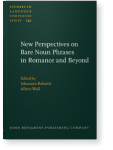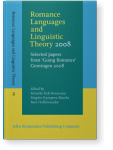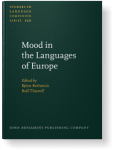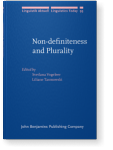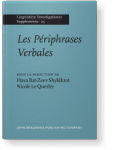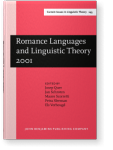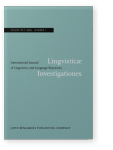Brenda Laca
List of John Benjamins publications for which Brenda Laca plays a role.
2013 Spanish bare plurals and topicalization New Perspectives on Bare Noun Phrases in Romance and Beyond, Kabatek, Johannes and Albert Wall (eds.), pp. 95–120 | Article
Taking issue with the unsatisfactory aspects of the “ambiguity” approach to BPLs, Dobrovie-Sorin and Laca (1996, 1998, 2003) endeavoured to develop an account that could recover Carlson’s (1977) original insight as to the semantic uniformity of English BPLs, while at the same time doing justice to… read more
2010 The puzzle of subjunctive tenses Romance Languages and Linguistic Theory 2008: Selected papers from 'Going Romance' Groningen 2008, Bok-Bennema, Reineke, Brigitte Kampers-Manhe and Bart Hollebrandse (eds.), pp. 171–194 | Article
Building on previous findings on tense construals and on constraints on modal-temporal configurations, this paper presents a semantic analysis of subjunctive tenses in Spanish which departs from the defective-tense hypothesis. The subjunctive tense system is analysed in a parallel way to the… read more
2010 Mood in Spanish Mood in the Languages of Europe, Rothstein, Björn and Rolf Thieroff (eds.), pp. 198–220 | Article
2006 Indefinites, quantifiers and pluractionals: What scope effects tell us about event pluralities Non-definiteness and Plurality, Vogeleer, Svetlana and Liliane Tasmowski (eds.), pp. 191–217 | Article
2005 Périphrases aspectuelles et temps grammatical dans les langues romanes Les Périphrases Verbales, Bat-Zeev Shyldkrot, Hava et Nicole Le Querler (dir.), pp. 47–66 | Article
2003 From Non-Identity to Plurality: French Différent as an Adjective and as a Determiner Romance Languages and Linguistic Theory 2001: Selected papers from 'Going Romance', Amsterdam, 6–8 December 2001, Quer, Josep, Jan Schroten, Mauro Scorretti, Petra Sleeman and Els Verheugd-Daatzelaar (eds.), pp. 155–176 | Article
1994 Le Pluriel Indéfini de L'attribut Métaphorique Lingvisticæ Investigationes 18:1, pp. 27–47 | Article
The Romance languages, with the exception of French, admit two ways of expressing indefiniteness in the plural, the bare plural (- N) or the plural introduced by a special determiner (Det N). We show that Det N is selected when reference is made to particulars, as opposed to mere categorization by… read more
